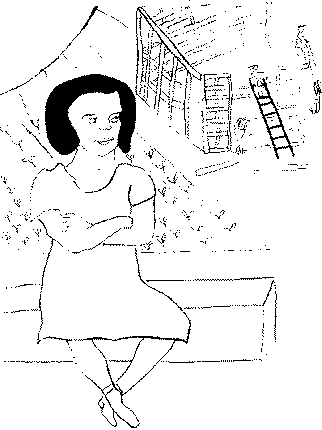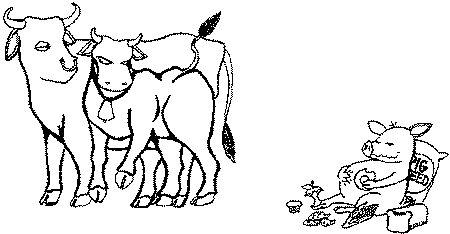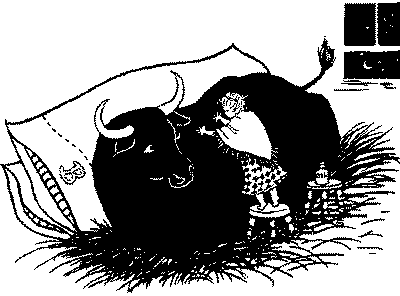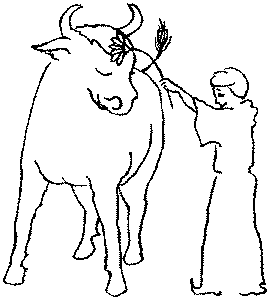31. THE HEAVEN OF 33 [CHAPTER 1. CO-OPERATION]

Once upon a time, when King Magadha was ruling in the land, there was a young noble called, ‘Magha the Good’. He lived in a remote village of just 30 families. When he was young, his parents married him to a girl who had qualities of character similar to his own. They were very happy together, and she gave birth to several children.
The villagers came to respect Magha the Good because he always tried to help improve the village, for the good of all. Because they respected him, he was able to teach the five steps of training, to purify their thoughts, words and deeds.
Magha’s way of teaching was by doing. An example of this happened one day when the villagers gathered to do handicraft work. Magha the Good cleaned a place for himself to sit. Before he could sit down though, someone else sat there. So he patiently cleaned another place. Again a neighbor sat in his place. This happened over and over again, until he had patiently cleaned sitting places for all those present. Only then could he himself sit in the last place.
By using such examples of patience, Magha the Good taught his fellow villagers how to cooperate with each other, without quarrelling. Working together in this way, they constructed several buildings and made other improvements that benefitted the whole village.
Seeing the worthwhile results of patience and cooperation, based on following the gentle ways of the Five Training Steps, all in the village became calmer and more peaceful. A natural side effect was that former crimes and wrongdoing completely disappeared!
You would think this would make everybody happier. However, there was one man who did not like the new situation at all. He was the head of the village, the politician who cared only about his own position.
Formerly, when there were murders and thefts, he handed out punishments. This increased his position of authority, and caused the villagers to fear him. When husbands or wives had affairs with others, the head man collected fines. In the same way, when reputations were damaged by lies, or contracts were not lived up to, he also collected fines. He even got tax money from the profits of selling strong liquor. He did not mind that drunkenness led to many of the crimes.
It is easy to see why the head man was upset to lose so much respect and power and money, due to the people living peacefully together. So he went to the king and said, “My lord, some of the remote villages are being robbed and looted by bandits. We need your help."
The king said, “Bring all these criminals to me."
The dishonest politician rounded up the heads of all 30 families and brought them as prisoners to the king. Without questioning them, the king ordered that they all be trampled to death by elephants.
All 30 were ordered to lie down in the palace courtyard and the elephants were brought in. They realized they were about to be trampled to death. Magha the Good said to them, “Remember and concentrate on the peacefulness and purity that come from following the Five Training Steps, so you may feel loving-kindness towards all. In this way, do not get angry at the unjust king, the lying head man, or the unfortunate elephants."
The first elephant was brought in by his mahout. But when he tried to force him to trample the innocent villagers, the elephant refused. He trumpeted as he went away. Amazingly, this was repeated with each of the king’s elephants. None would step on them.
The mahouts complained to the king that this was not their fault. “It must be," they said, “that these men have some drug that is confusing the elephants."
The king had the villagers searched, but they found nothing. Then his advisers said, “These men must be magicians who have cast an evil spell on your mighty elephants!"
The villagers were asked, “Do you have such a spell?" Magha the Good said, “Yes we do." This made the king very curious. So he himself asked Magha, “What is this spell and how does it work?"
Magha the Good replied, “My lord king, we do not cast the same kinds of spells that others cast. We cast the spell of loving-kindness with minds made pure by following the Five Training Steps."
“What are these Five Training Steps?" asked the king. Magha the Good said, “All of us have given up the five unwholesome actions, which are: destroying life, taking what is not given, doing wrong in sexual ways, speaking falsely, and losing one’s mind from alcohol."
“In this way we have become harmless, so that we can give the gift of fearlessness to all. Therefore, the elephants lost their fear of the mahouts, and did not wish to harm us. They departed, trumpeting triumphantly. This was our protection, which you have called a ‘spell’."
Finally seeing the wholesomeness and wisdom of these people, the king questioned them and learned the truth. He decided to confiscate all the property of the dishonest village head man and divide it among them.
The villagers were then free to do even more good works for the benefit of the whole village. Soon they began to build a big roadside inn, right next to the highway crossroads.
This was the biggest project they had yet undertaken. The men were confident because they had learned so well how to cooperate with each other for a common goal. But they had not yet learned how to cooperate in this work with the women of the village. They seemed to think it was ‘man’s work’.
By this time Magha the Good had four wives. Their names were Good-doer, Beauty, Happy and Well-born. Of these, the first wife, Good-doer, was the wisest. She wanted to pave the way for the women to benefit from cooperating in doing good work. So she gradually became friendly with the boss in charge of the roadside inn project.
Because she wanted to contribute by helping in a big way, she gave a present to the boss. She asked him, “Can you think of a way that I may become the most important contributor to this good work?"
The boss replied, “I know just such a way!" Then he secretly constructed the most important part of the building, the roof beam that would hold the roof together. He wrapped it up and hid it with Good-doer, so it could dry for the time necessary to become rigid and strong.
Meanwhile, the men of the village continued happily in the building project. At last they got to the point of installing the roof beam. They began to make one, but the boss interrupted them. He said, “My friends, we cannot use fresh green wood to make the roof beam. It will bend and sag. We must have an aged dry roof beam. Go find one!"
When they searched in the village, they found that Good-doer just happened to have a perfect roof beam. It was even the right size! When they asked if they could buy it from her, she said, “It is not for sale at any price. I wish to contribute the roof beam for free, but only if you let me participate in building the inn."
The men were afraid to change their successful ways. So they said, “Women have never been part of this project. This is impossible."
Then they returned to the construction boss and told him what had happened. He said, “Why do you keep the women away? Women are part of everything in this world. Let us be generous and share the harmony and wholesomeness of this work with the women. Then the project and our village will be even more successful."
So they accepted the roof beam from Good-doer, and she helped to finish the building of the inn. Then Beauty had a wonderful garden built next to the inn, which she donated. It had all kinds of flowers and fruit trees. So, too, Happy had a lovely pond dug, and planted beautiful lotuses in it. But Well-born, being the youngest and a little spoiled, did nothing for the inn.
In the evenings, Magha the Good held meetings in the roadside inn. He taught the people to assist their parents and elders, and to give up harsh words, accusing others behind their backs, and being stingy.
It is said that the lowest heaven world contains the gods of the four directions, North, East, South and West. Because he followed his own teachings, Magha the Good died with happiness in his heart. He was reborn as Sakka, king of the second lowest heaven world.
In time, the heads of all the other families of the village, as well as Good-doer, Beauty and Happy, also died. They were reborn as gods under King Sakka. This was known as the “Heaven of 33″.
The Heaven of 33 [Chapter 1. Co-operation]
Link: https://hhdorjechangbuddhaiiiinfo.com/2022/07/05/the-heaven-of-33-chapter-1-co-operation/
INTERPRETER’S INTRODUCTION – BUDDHIST TALES FOR YOUNG AND OLD, VOLUME 1, STORIES 1-50
#Buddhisttalesforyoungandold #Buddhiststories #storiesforkids #moralstories #Buddha #Jatakastories #PansiyaPanasJataka


